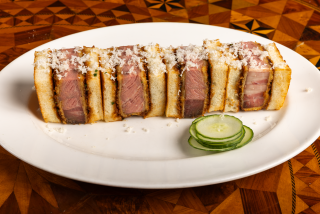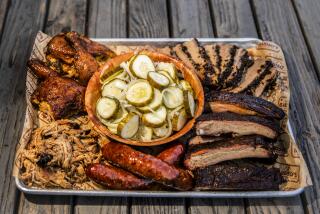When soul food met tiki
- Share via
But why are they spareribs?
The name sounds self-explanatory. They’re probably the unneeded part of the ribs, right? The bare bones from which the meaty chops and the rich bacon have both been trimmed? Or maybe it’s this -- they’re the part of the rib bone that is spare, meaning lean and scanty?
Surprisingly, no. Either explanation would make perfect sense and our world would be a simpler place, but neither is correct. The real story is rather twisted.
In 17th century England, spareribs were also called spear-ribs or even ribspare, a clear tipoff that this wasn’t a native English word. It was borrowed from the German rippespeer, which is smoked pork loin.
But the 17th century English didn’t smoke their spareribs, and they didn’t make them from the loin. They still don’t. In England, for some reason, the sparerib has always come from the pork shoulder. It’s the boneless slab of meat that lies above the shoulder blade.
Sometimes, English butchers saw up the shoulder to make what they call sparerib chops. When American butchers do the same, we call the result blade bone chops.
So here’s another twist. In this country, butchers often butterfly blade bone chops, and guess what they’re called then? Country-style spareribs.
Got all that?
Those “country-style spareribs” of shoulder meat, which many have suspected of being a meat industry marketing ploy, turn out to preserve the English definition of spareribs, which prevailed in this country for most of its history. Clear through the 1890s, spareribs still referred to shoulder meat in American cookbooks, even Southern cookbooks. What we now call spareribs they treated as part of the belly (the “middlings”).
It was not an admired part of the hog. When old cookbooks even bothered to suggest a way to cook middlings, it was usually the standard treatment for a nondescript cut: Stuff it with breadcrumbs and bake it.
Some people cooked spareribs German style, braising them with sauerkraut. Ribs with kraut or even plain cabbage is still a traditional New Year’s good-luck dish in many places. There also may be an Irish connection, because in Ireland the word “spareribs” has the same meaning it took on here during the 20th century.
The rib redemption
Spareribs were scarcely a national favorite a hundred years ago. But African Americans had been perfecting their own long, slow style of cooking spareribs at low heat in smoky pits. Southern-style barbecue gradually diffused throughout the country during the 20th century, along with tomato-based barbecue sauces, though it had to adapt to other ways of cooking along the way. In the absence of proper barbecue pits, lots of mid-century “barbecue” recipes were actually braised -- baked in what amounted to a barbecue sauce -- or grilled on the backyard charcoal barbecue.
And at backyard cookouts all over the country, Southern barbecue also met up with the ‘50s and ‘60s craze for Polynesian cuisine. Spareribs were an essential part of the tiki menu. You couldn’t serve a credible pupu platter without Cantonese-style glazed spareribs.
The result was a new national awareness of this once-disregarded cut of meat, and it has become so popular that, at the height of barbecue season, it can be more expensive than pork chops. Like other odd pork parts such as pigs’ feet and chitterlings -- or, for that matter, greens, the discarded tops of such root vegetables as turnips and beets -- spareribs originally had been something the plantation owners didn’t value and willingly let their slaves have, but generations of obsessive cooks have discovered their virtues.
True, spareribs aren’t as meaty or as easy to cook as pork chops, but as Chinese gourmets say, the closer to the bone, the sweeter the meat. It takes some gnawing to get at it, but the meat on spareribs has an excellent flavor and a sweet moistening of fat. Rubbed with spices, slowly barbecued and brushed with a spicy, sweet-sour sauce, spareribs can be far more interesting than any pork chop.
Spare ribs, indeed. We can’t do without them.
More to Read
Eat your way across L.A.
Get our weekly Tasting Notes newsletter for reviews, news and more.
You may occasionally receive promotional content from the Los Angeles Times.







